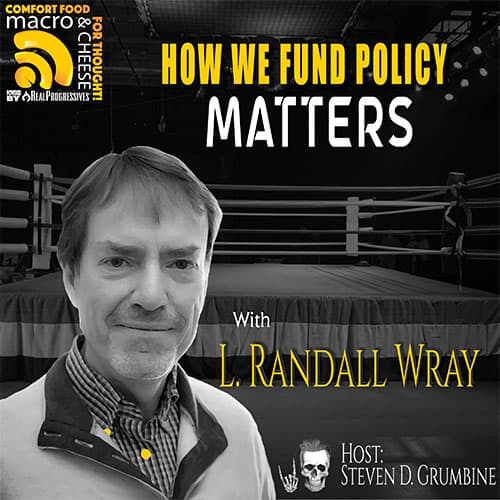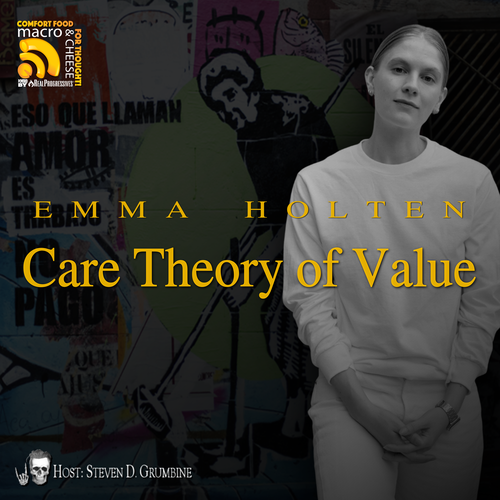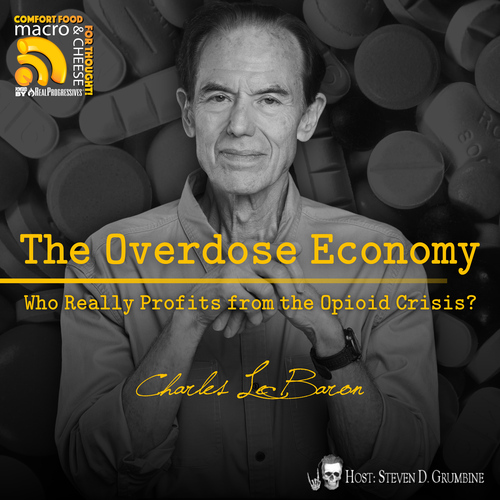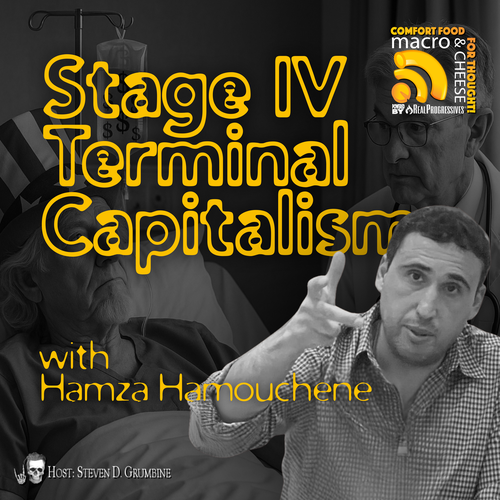Episode 128 – How We Fund Policy Matters with L. Randall Wray

FOLLOW THE SHOW
Rep. Yarmuth came out of the closet as an MMTer and Steve’s guest, L Randall Wray, has background intel. Wray also talks about the interconnected pandemics of racism, inequality, climate catastrophe, and more.
L. Randall Wray is a founding father of Modern Monetary Theory and is always a welcome guest on this podcast. This is his SIXTH episode of Macro N Cheese.
Our community recently celebrated Congressman Yarmuth’s statement in support of MMT and his shout-out to The Deficit Myth. Randy tells Steve he was invited to speak to Yarmuth and his staff in 2019. He had planned to make a presentation on the data to show deficit fears have never come true.
And so I sent them a bunch of slides and they said, “Yeah, this is good, but we really want you to talk about MMT. This is what Yarmuth wants. And he said that we’re all talking about this and the Democratic side is pretty much on board, they really do want to hear the explanation.”
Sounds promising, but we’re far from out of the woods. We’re facing multiple pandemics in addition to Covid – the pandemics of racism, inequality, climate catastrophe are but a few, each linked to each other. The climate crisis has caused a pandemic of fires, of heat, of oceans rising, all of which lead to a pandemic of refugees. They must be tackled simultaneously.
The private sector has proven inept at solving these problems, partly because addressing such massive issues requires a carefully coordinated and centrally planned effort. In the case of the climate, only a global effort will do. Major economic powerhouse countries like the US, China, and Russia need to take proactive roles in addressing our environmental crises, as they have the fiscal ability to mobilize resources on a mass scale, AND they’re the nations most responsible for the climate emergency.
Steve asks Randy to talk about and look at the current push for universal single payer health care in the US, and explain why a state by state approach cannot work. On the state level there are a series of interrelated problems that cannot be avoided. Certain programs – like healthcare, unemployment compensation, or a job guarantee – require open-ended spending. If someone meets the requirements, the service must be provided. During an economic downturn, a state’s tax revenue is shrinking while the demand for services is expanding. Necessary programs providing jobs and healthcare, must be federally funded; there’s no way around it.
Randy reminds us that careful analysis shows how Medicare for All is going to significantly reduce the number of resources needed to devote to health care. So it’s not just that the federal government can afford it, there’s really no credible argument against it.
The episode looks at the problems causing migration from rural areas to urban centers, while neglect of infrastructure causes flight from the cities into the suburbs. As always, Randy brings clarity to these complex questions.
Be sure to check out the Transcript and Extras pages in the Macro N Cheese section of our website.
L. Randall Wray is a Professor of Economics at Bard College and Senior Scholar at the Levy Economics
Macro N Cheese – Episode 128
How We Fund Policy Matters with L. Randall Wray
July 10, 2021
[00:00:03.240] – Randall Wray [intro/music]
When deficits are incurred, states get downgraded. They can default on their debt and there have been cases of them defaulting. Orange County is a very famous case, one of the richest parts of the whole country. The county defaulted on its debt and there were real consequences of that – downsizing, education and police, and so forth.
[00:00:28.810] – Randall Wray [intro/music]
We have to return to an economic system that recognizes that you need a big government that is the currency issuer, and I think the days of neoliberalism are over. The argument that the government is the problem, not the solution, is over.
[00:01:35.220] – Geoff Ginter [intro/music]
Now, let’s see if we can avoid the apocalypse altogether. Here’s another episode of Macro N Cheese with your host, Steve Grumbine.
[00:01:43.050] – Steve Grumbine
All right, this is Steve with Macro N Cheese. Today, I have none other than L. Randall Wray, who has written some really phenomenal books, including “The Primer for Modern Monetary Theory” and the book “Modern Money.” I am very glad to have him join me today because we’re going to continue down the path that we’ve been pursuing, understanding the role of the federal government and the states, understanding specific nature of the limits and the possibilities of the federal government and the states and really understanding the impacts, as we’ve talked about before with Warren Mosler of John Yarmuth’s great coming out party on C-SPAN the other day, where he basically gave a clinic on Modern Monetary Theory, gave a hat tip to Stephanie Kelton’s book, “The Deficit Myth,” and also proceeded to say basically that we can do this stuff. We can do what we need to do. So without further ado, let me bring on my guest, Randy, thank you so much for joining me again, sir.
[00:02:46.330] – Randall Wray
Hi. Good to be back.
[00:02:47.940] – Grumbine
Yeah, it feels a little bit like wash, rinse, repeat, because some of these lessons seem to be things that we’ve talked about before. And it seems like before we had this big push for MMT that we were seeing some of these same things happen way back in the 70s when I was a little kid. And the idea of states basically eating themselves alive, pushing taxes, watching flight from the cities, watching these donuts, as you said offline occur inside of each of these micro-economies. Let’s start with an understanding of currency issuer, currency user and the federal government and the states.
[00:03:34.420] – Wray
OK, sure. So in the United States, it’s fairly obvious to everyone that it’s the federal government that issues our currency, that is even in the Constitution, that only the US Congress can issue the currency. And so we say the federal government is the currency issuer. This is a plain statement of fact. And then there’s lots of stuff that followed from that.
And that’s what MMT has been focused on, the policy space that’s available to the sovereign government that issues the currency. We probably don’t have to go through that in detail. State and local governments are users of that currency. They don’t issue a currency and they really do need to finance their spending either through tax revenue or through borrowing. State enterprises, I suppose, are possible that generate revenue.
So they really need to get the financing first before they can spend. Forty-eight of the states have constitutional requirements to balance the budget, so when a budget is proposed, it must be balanced or run a surplus. Now, that doesn’t mean that they always do run surpluses. The typical case is in a deep recession, tax revenue falls a lot. Some kinds of state spending go up automatically.
States participate in things like Medicaid and in unemployment compensation. So there’s some spending that will increase. They have some discretion to cut spending and they typically will do that when tax revenue falls. So they will lay off teachers, lay off police, and we feel the effects of that when that happens. So that’s typically what happens in recession. The federal government doesn’t have to do that.
And in fact, when it’s tax revenue falls significantly in recessions, as it always does. Let me put just a little footnote that I’ll come back to because covid has been different. When revenue falls, they typically increase spending on those automatic stabilizer-type things, and they also discretionarily increase their spending a bit on what we call government consumption, stimulus packages and things like that, so they can move the opposite direction as the currency issuer.
And they don’t have to worry about where the money is going to come from because it always comes from payments that are made on the behalf of the Treasury by the Fed. OK? So that’s what MMT has been demonstrating for 25 years. As Warren always says, we’re yet to have any legitimate criticism of any of our descriptions. There are no flaws in that description. So anyway, when we look at the difference between the two, it’s pretty stark.
The things that are often said about the federal government, “Oh, you got to run the federal government just like it was a household or a firm,” are completely false. But if you applied those to state and local governments, it’s not nearly so false. They do have to try to balance their budgets, both because of the constitutional requirements that they’ve imposed on themselves, but also because markets do react.
When deficits are incurred, states get downgraded, city governments get downgraded, they can default on their debt and there have been cases of them defaulting. Orange County is a very famous case, one of the richest parts of the whole country. The county defaulted on its debt and there were real consequences of that downsizing, education and policing, and so on.
When the euro was formed way back in the mid 90s, as we were developing MMT, we applied our kind of analysis to the formerly sovereign countries of Italy and Greece and France and Spain and Portugal and said that the problem with the setup was that those countries no longer were currency issuers, they were currency users. The ECB was the issuer, and it was prohibited from doing the kinds of things the Fed does for the US Treasury.
So they became more like US states. And so we analyzed them as sort of this strange new invention that was trying to tie the purse strings of these formerly sovereign nations by making them more like US states. And we said it’s going to end up in a disaster and it did end up in a disaster. There are some differences. I don’t want to say. It’s a perfect analogy to say that Greece is just like Louisiana, but there are similarities and there are problems of that.
[00:09:02.740] – Grumbine
That was fantastic. I am of great concern. We’ve talked at length about MMT for years now. You’ve been on the show with me, you’ve been on other shows with me. I’ve watched you many, many times. Your writings have directly impacted my understanding of MMT. In fact, I’ve been on record many times saying you’re probably the most influential of the MMT developers in terms of my understanding.
And I guess the question I have is, given the extreme nature of the things that are impacting both the climate right now and the health care in America, which is absolutely an embarrassment, it’s horrific. We should be thinking about how to solve more than one problem at one time because we’ve got problems that are not negotiating with one another. They’re kind of coming together in a perfect storm with the climate situation.
We got the Arctic burning up. It was 118 degrees. We’ve got these zombie fires beneath the frost in the marsh. We’ve got all kinds of heatwaves going through the Pacific Northwest. I believe that it was 109 degrees in Seattle. I think it was 116 degrees in Portland, Oregon. So we’ve got an existential climate crisis going on as well right now, coupled with a failed health care system and a failed education system and a failed marketplace for public option for jobs.
We have a lot going on that has to be done right now. Piecemeal probably isn’t going to get it done. And yet the only person I’ve heard in Congress really take a bold stand was John Yarmuth. We had celebrated AOC tipping her pinky toe into the water, but watching John Yarmuth the other day speak, we played a clip with Warren Mosler in our podcast, but I think everybody’s had a chance to hear that, and if they haven’t, I suggest going to C-SPAN and checking it out.
But it’s obvious that Congress is getting clued in. The work that Stephanie has done with “The Deficit Myth,” and all the work that you all have done in helping people like myself get the word out at an activist level and all the stuff you’ve done in Congress. What is the temperature like for the federal government right now? Are we starting to see a thawing there where they’re starting to realize, hey, maybe we ought to do something?
[00:11:35.150] – Wray
Yeah, in fall 2019, Yarmuth invited me to the Budget Committee and I gave a talk and I talked to him beforehand. I talked to his staff on the phone so that they could tell me what they wanted me to do there. And I was surprised because I thought I should put together a presentation that would just focus on the data and show that all the fears about deficits have never come true.
So demonstrate the whole Orthodox thinking about deficits and debt is just completely wrong. And so I sent them a bunch of slides and they said, “Yeah, this is good, but we really want you to talk about MMT. This is what Yarmuth wants. And he said that we’re all talking about this and the Democratic side is pretty much on board, they really do want to hear the explanation.”
And I got a bit of a warning just before I went to Washington that a right-wing think tank had prepared the talking points for the Republicans. And so if anyone’s watched that video, you’ll see they’re like zombies. They’ve been programmed to just repeat those talking points. That’s all they did.
The Democratic side, so I was assured that they were on board. And I think that Yarmuth’s interview recently demonstrates just how onboard they are. This is not just him. I know he was only speaking for himself, but I think that the others on the Budget Committee, the other Democrats, share many of those same views. So the tide has turned.
[00:13:27.900] – Grumbine
That’s huge. That’s huge.
[00:13:31.110] – Wray
They’re still, of course, are politics. There’s still is hesitation about what can be said in public because you’ve got to run again and whatever you say will be used against you by the Republicans using the usual scare tactics. So I’m not saying it was going to come out and be as forthright as him. People in safe districts, I guess, could do that.
But, you know, they’ve got to be careful about what they say and how they vote and so on. I understand all that. But just as far as the message getting through, it has gotten through. And I think that also explains why we were able to have $5 trillion through in various relief packages. Some people call it stimulus, but there was no stimulus.
It was really without talking about pay fors. But as we see, pay for is being used by both sides actually in the next four trillion. So, the ideas are there, the politics are still difficult. We’re not home free and as you said, we face multiple pandemics and they are all linked. The person who I think got that earliest well, at least the person I’m aware of and who wrote about it very clearly to demonstrate all of these things were linked was Naomi Klein.
So we have a pandemic of racism. We have a pandemic of climate catastrophe. We have a pandemic of covid. We have a pandemic of inequality unlike this country has ever seen before, driven home by Pro Publica’s piece on tax avoidance, a pandemic of fires, pandemic of heat, pandemic of oceans rising, which then leads to a pandemic of refugees.
All of these things are linked. And so you’re absolutely right. They all have to be tackled simultaneously. We can’t tackle racism without tackling the health pandemic that we have the unequal access to health care. The covid impacts people of color much more greatly than college educated white people, for example, who have much better access to health care and also better access to good information.
So we have to do all of these things, the private sector, which is for profit, cannot do this first because a lot of it would not be profitable for them. But second, because it requires coordination, not just national coordination, it requires international coordination. It does no good to wipe out or almost wipe out covid in the United States alone, because it’s a health problem that easily spreads and will reappear again in a more virulent form.
It has to be tackled globally. Climate change. It does no good to green the US economy if we don’t green the rest of the world. So anyway, we have to tackle all of them, private sector cannot do this. They can play some role in it, but it has to be government and for the reasons that we just went through, it has to be the currency issuer and it has to be the biggest, most powerful, richest countries that do most of the work because they can mobilize the resources.
They are the source of most of the problems. So it is right that they do it. They have the resource and financial capacity to do it, so we have to return to an economic system that recognizes that you need a big government that is the currency issue. And I think the days of neoliberalism are over. The argument that the government is the problem, not the solution, is over.
We’ve seen the countries that either because of incapacity of their leadership, the US, Brazil, the U.K. and India, the covid problem is much worse in those countries where you did not have good leadership. So you need a big government with good leadership in order to tackle these problems.
[00:18:15.560] – Grumbine
There’s two climate scientists that came out, and I just want to read this quote to you to put an exclamation point on what we’re talking about here and giving a hat tip to Naomi Klein, Bob Henson and Jeff Masters. They said, “Never in the century-plus history of world weather observation have so many all time heat records fallen by such a large margin then in the past week’s historic heat wave in western North America, meteorologist Bob Henson and former National Oceanic and Atmospheric Administration (NOAA) hurricane scientist Jeff Masters wrote for Yale and Climate Connections.
It’s not hype or exaggeration to call the past week’s heat wave the most extreme in the world weather records. They are the only heat wave that compares is the great Dust Bowl heat wave of 1936 in the US Midwest and South Central Canada. Even that did not compare to what happened in the Northwest and western Canada over the past week.”
And this to me should take the debate out of the debate and should put us into mobilization, organizing and activating our nation at that grand central government level to push this. I know that there is a great desire for local and state direct local action, and that’s very noble. And we need that. We need everybody all hands on deck. But it’s quite clear that to your point, it has to be a global effort because this marble keeps turning and what impacts one area will have impacts across the globe.
So with that in mind, we have talked about this in other venues. I want to be crystal clear. My intention is not to sabotage anyone’s activism, but we have people pushing for state based health care. And I’ve even seen folks pushing for state based reparations. We’ve watched people try to push for a local green new deal. These are things that are born in a good heart but have disastrous consequences.
And I was looking at the CAFR (Comprehensive Annual Financial Report) reports for the various states across the U.S. and a vast majority of them are not in great shape. Their reserves are quite low and their ability to absorb any kind of real shock is very limited. I’m curious, what would be your message to considering the idea of state based Medicare for all and the viability of such a proposal?
[00:20:57.000] – Wray
Well, I think the usefulness of state initiatives and cities also have initiatives, is a demonstration. So I’m a native Californian and California always had either the toughest or among the most tough environmental, especially air quality requirements. So I can remember when California got the lead out of gasoline and required much better emission systems on cars. And gradually those things were adopted by the EPA. So it’s very valuable.
And, you know, this is what activists do. Activists in California push this and we got it in California. And then eventually the U.S. gets on board. And that was back when the federal government wasn’t that bad. But if you compare it to the federal government that we’ve had since the days of Ronald Reagan, at least, it’s much harder to get them to do things like that. So you can see why activists have sort of given up on the federal government.
It’s just too hard, even though the Democrats did OK, I guess, in the last election. It’s still 50/50. So they have to go to all sorts of extremes to try to get anything through. So it’s completely understandable that activists in more progressive states think that they’ve got to go it alone and it would be useful as a demonstration project, then might spread and might eventually go to the federal level.
I think there are a couple of objections. So one is maybe things are changing at the federal level. So that’s what we were just talking about. I think we should not be giving up. A broad based green new deal that includes Medicare for All, which was the Bernie proposal, AOC proposal, we shouldn’t give up, and Yarmuth in his talks said, you know, look, we’re going to submit everything we possibly can to the vote.
But the vote is not going to constrain us. We’re going to go to reconciliation and we’re going to get the rest of the package. That’s what he said. He’s very optimistic. Now maybe he’s a little too optimistic. I don’t know. But he’s the politician, not me.
[00:23:41.200] – Grumbine
[Laughter] Right.
[00:23:41.200] – Wray
So I presume that he has a pretty good idea of how this is going to progress. So we should not be giving up. The second reason is that the states are currency users. They really do have to balance their budgets. And as I said, what happens in recessions is tax revenue plummets. They use up their rainy day funds and then they have to start cutting spending. And they have to prioritize what they can spend on.
The thing about Medicare for All is this is open ended spending. A job guarantee is also open ended spending, unemployment compensation, open ended. That is, if someone meets the requirements, then you have to spend. And in bad times, typically, the number of people who meet the requirements is going to go up so people get laid off from their private sector jobs and they need unemployment compensation, they need housing assistance, and they’re going to go off their employer provided private health insurance.
So more are going to flow into the Medicare for All program and unemployment compensation into whatever kind of housing programs the states have. So just at the time the states are losing tax revenue, their spending will go up. So they’re going to face problems. I said I would give a footnote on the pandemic because this time around, the federal government provided $5 trillion of relief.
And states got through this recession, which if you just look at the aggregate numbers, this recession would look like the worst that we ever had since the Great Depression. And that should have just absolutely devastated state and local government budgets, but it didn’t. Now they’re impacted. I’m not trying to say, you know, nothing bad happened, but considering how many people lost their jobs, how many businesses shut their doors, as many are temporary, we hope, but how many had to shut down?
This should have been an absolute disaster for state governments. But the federal government provided income to households and had a wide variety of ways to support business and also provided funding to state and local governments. So what this says is state and local government budgets will worsen tremendously unless the federal government steps in which they did.
So that brings up another issue, which is that back during the Nixon years, I’m not sure that Nixon created these block grants, but he increased the amount. I can remember this. Unlike you, I wasn’t a kid, but I don’t remember all the details. But Nixon provided block grants to the states and those were bad times. In the early 70s, we had two recessions in a row, our first significant recessions since the Great Depression.
And Nixon provided block grants that allowed states to spend more than they could spend out of their tax revenue and borrowing. So that plus what we just did this time around shows how you could implement programs at state and local government levels with supplemental funding from the federal government that could protect them against the cyclical movements of their tax revenue. And so that goes part of the way towards solving the problem.
But then the third objection to having state and local governments do it is we’re all supposed to be Americans and we all should have access to the same good things. And why should it be because I happen to live in Mississippi that I can’t get Medicare for All because my state is run by racist politicians who don’t want health care to be provided to all residents of their states. And so right now they’re turning down Medicaid.
[00:28:32.960] – Grumbine
It’s preposterous.
[00:28:34.820] – Wray
Sorry. I don’t want to say it’s Mississippi because I haven’t seen the list, but it’s a very large number of Republican run states are turning down funding the federal government wants to supply them to give health care to low income people in their states.
That just tells you how far they will go to make sure that people of color in their states won’t have adequate coverage of health care. Maybe this is the biggest objection to doing it that way, and why should California have much cleaner running cars? I can remember when L.A. was like Beijing occasionally is now.
[00:29:16.770] – Grumbine
Smog was crazy. When you’d fly in you could see the clouds.
[00:29:20.380] – Wray
You know, they substantially cleaned it up because they had tougher air quality regulations. Why should Californians get cleaner air? Because they have a more responsible government, but other states don’t? We all should have access to the same quality of life in America, across America. So I think this is the biggest argument for universal coverage of all the necessities of life.
[00:30:03.360] – Intermission
You are listening to Macro N Cheese, a podcast brought to you by Real Progressives, a nonprofit organization dedicated to teaching the masses about MMT or Modern Monetary Theory. Please help our efforts and become a monthly donor at PayPal or Patreon, like and follow our pages on Facebook and YouTube and follow us on Periscope, Twitter and Instagram.
[00:30:52.400] – Grumbine
Let me ask you real quick before you go further. If I’m living in Mississippi or Alabama or Idaho even, and I am needing health care and just over the hill is a state that provides, quote-unquote, “Medicare for All,” and in my state, I’m screwed. Are we going to be asking for people to check their papers as they cross the state border?
As of now, there’s studies out there that show people are going on vacation to Europe to get treatment. They’re going to Mexico to get treatment because they can’t get it in the United States. We joke about it. But what would stop an influx of the most vulnerable people moving in and trying to get this because they’re desperate?
[00:31:38.260] – Wray
Yeah, that is the result you would hope. So, if California has cleaner air and Medicare for All and a job guarantee, you would hope that all the low income discriminated against people all over the country would move to California. That would be a solution. Then they would get the universal coverage. And let the other states just dry up, everybody moves out. That would be a good solution, I think. You vote with your feet. You say, I’m not going to live in a state.
[00:32:14.360] – Grumbine
But what about the revenue, though? That’s what I’m concerned with, the revenue, the poverty going into the state and burden that that would put on the state that doesn’t have the ability to generate its own currency. That’s my concern.
[00:32:27.720] – Wray
OK, I know. I know. I know. And that’s why states do enact residency requirements and a six month residency before you get access and so on, which you can understand why they do it. But I’m just talking about sort of the utopian vision
[00:32:45.470] – Grumbine
I get it. I’m just being silly.
[00:32:46.940] – Wray
All the red states, they can go ahead and they can have their crazy right wing politicians and no population because everyone votes to leave. I would see that as a good result. Yes, I know. Realistically, first, you can’t house 350 million people in California. There would be serious environmental consequences of trying to do that and so on.
And then, yes, the revenue will be the great fear. So there will be attempts to try to limit who has access to that. And so then you have what we already have in the United States, a problem of nativism. You’re going to have a very narrow view of who is the nation. You have to be second or third generation Californian to get access to the good things. So, yes, that creates lots of problems too. So I was sort of joking a bit,
[00:33:48.770] – Grumbine
I gotcha.
[00:33:48.770] – Wray
But obviously the best solution is to have it as a national policy. The federal government can afford this. The question is resources. But any careful analysis shows they’re going to Medicare for All is going to reduce the number of resources we need to devote to health care significantly. Yeva Nersisyan and I did a Green New Deal paper for the Levy Institute, and so just to be really, really safe, we said it would only save something like 3.5 percent of the resources we already use.
But you could make the argument that the US is approaching 20 percent of all GDP is devoted to health care. The next closest nation is about 10 percent, and they have much better outcomes than we do. So typically, European countries, Canada, Japan is significantly below 10 percent with much better outcomes than we do.
So you can make the argument that 10 percent should be enough, which means we have at least half of the resources we use now by moving to Medicare for All. So you’re not going to be using more resources by implementing a much more efficient health care delivery and payment system, which is what Medicare for All is.
[00:35:15.540] – Grumbine
Let me ask you a question on the resource front. Nurses and doctors and specialists, there are a finite supply and we know that there are a lot of very important decisions that many people have put on hold because we have not taken care of these things. I know for myself, if there was universal dental, I would have a whole bunch more work done right now because I’m in bad shape.
However, without having that kind of understanding of do we have enough doctors and nurses at the federal level, even, how would a state be able to overcome. Wouldn’t they have to plan? And also, the other thing that’s of concern is that many states in general do not have clinics, do not have the baked in hospital space.
So people have to drive hours to get to care. The question is, do we really have the care where it’s needed and do we have enough of the specialists that provide the services, not just the administration staff, so to speak?
[00:36:19.390] – Wray
Yeah. So because we rely so much on markets, OK, and not nearly enough on any kind of national planning, we have huge failures throughout the system. So we have far too many people working in the insurance part, either selling, processing claims, denying claims, all of that stuff is using up labor resources, OK?
And those people could have been trained instead to actually provide health care or do something else useful, because the insurance part of this is not useful at all. It’s profitable, but it’s not socially useful. And it would go away if we had Medicare for All. And then those who do go into the actual medical care delivery also react to incentives.
The pay is much higher to be a specialist, and so we have areas where there are plenty of doctors who provide that special care and not nearly enough general practitioners. And that’s partly because of the pay differential. And part of the reason why doctors care so much about their pay is because the medical education is so expensive, you know, that you’re going to get out with a hundred thousand two hundred thousand dollars of debt when you leave medical school.
So you can’t afford to be a general practitioner. So it also has something to do with that, how expensive the educational system is and how much debt students incur. Medical malpractice lawsuits have something to do with this. So anyway, because it’s so costly to be a doctor, the pay has to be very high and our pay is typically twice as high as it is for comparable professions in other rich, developed capitalist countries.
So it’s the whole system that is a problem. Planning every hospital of any size has to have the most expensive equipment in order to attract the patients or the specialized care, even though the equipment is not going to be used very much because it’s very specialized. But everyone has to have that. So that increases the cost rather than if you had a more planned system, we could get away with fewer of these specialized, expensive equipment.
And then you mentioned large parts of the country. Rural areas are greatly underserved because, again, we allow, for the most part, markets to decide where the hospitals will be located and it’s more profitable to be in city areas. So that’s where we end up with them. That’s the way the market works. So relying less on the market would allow us to have a system that serves people much better so that you could get good care out of rural areas, which then helps to support those communities, which will help to keep the populations there so that you don’t have to move to cities in order to get decent healthcare, decent education and so on.
I drove across the country three times recently. I mean, the whole distance, and I was shocked at what rural America looks like. I’ve driven across the country many, many times in my life, and the desperation you see in rural America. I mean, when you get way far away from the interstates is amazing. The towns are abandoned, the houses are abandoned.
There will typically be one big nice house with lots of very expensive farming equipment. The school is gone. The stores are gone. They’re all boarded up and falling down. And it’s part of this problem of not having the services. And then you get Trump who wants to close all the post offices and the whole philosophy behind having the post office was that they don’t have to make profit, but we’re going to have them everywhere.
We should have the same philosophy about good medical facilities and they don’t have to make profits, but they need to be everywhere so that people can get health care where they live and don’t have to move away. Same with schools.
[00:41:08.060] – Grumbine
Brings up a point. Warren, you and everyone talks about the money story and talks about the most rudimentary thing is one person’s spending is another person’s income and income is how we get taxes in this nation, especially at the state level. That’s the area they like the tax. And with that in mind, we’re talking about saving money – in other words, reducing spending.
And since the states haven’t been really doing the spending, it’s been the individuals. Reducing costs, maybe it takes away money from rich people at the top as it bubbles up, but there’s a lot of other intermediary jobs that seem to be caught in the crosshairs of that, quote-unquote “cost savings.”
And so that is tax revenue that that local jurisdiction loses out on and then that state loses out on and schools lose out on. But if I’m right, it sounds like there’s another problem here baked into this. As we try and save money, by extension, we’re also costing the state money. Is there any truth in that?
[00:42:12.810] – Wray
Yeah. So you mentioned donut holes. There was a lot of analysis of the creation of so-called donut holes in the centers of cities where the infrastructure is older and needs repair. It’s expensive. So you raise the tax rates so people start moving out to suburbs which have new infrastructure so that the costs are lower. [inaudible 00:42:39] Catamount played a big role in this in helping to promote white flight to the suburbs by helping to pay for the good roads that could allow you to commute in from suburbs.
And then it’s housing policy also helped to promote it. So there were lots of factors that led to it. But then the cities get into this vicious cycle where the tax base is declining. They have to start cutting things and a quality of schooling deteriorates. The quality of all the infrastructure deteriorates, city services deteriorate. So they got to raise the tax rate and so more people leave.
And I think that is happening in rural areas, too, now, so it’s not donut holes, it’s that you’re abandoning the middle part of the country and tax revenue goes down, which means the services get worse, which then promotes more emigration out to the cities and the coasts and so on. So that dynamic falling tax revenues or increased tax rates makes things really difficult.
[00:43:51.370] – Grumbine
One of the other major concerns is we have an eviction crisis getting ready to take place and we also have a mortgage foreclosure crisis getting ready to happen yet again. And I’m knee deep in that with Bill Black and others working on exposing some of the elite control fraud and the schemes that are going on that directly impact millions of people, yours truly included.
And the impact of foreclosures in states and gentrification and watching folks in San Francisco as an example where I think the average house is like a million dollars and you’ve got tent cities and homelessness in absolute insane levels, my greatest concern right now is people aren’t seeing this big picture. It’s almost too much to handle at one time and they just ignore it.
And they completely missed this. But within that scope, I don’t see any activity to prevent it. But this will directly impact not only state revenues, but schools and the people themselves. So all of the stuff that we just talked about from climate change to health care is directly impacted by this. And we saw how ugly it can get, especially with an inadequate federal response like what Obama did.
But for all of Biden’s flaws, I see at least something here. I am curious, though, there is no motion to take away student debt, to stave off evictions and foreclosures. What are your thoughts on the impacts of the eviction and mortgage foreclosure crisis we’re getting ready to face on states and their revenues? What are your thoughts?
[00:45:50.730] – Wray
I agree it’s going to be a very difficult fall and winter. And from the very beginning, when Trump was proposing sending out checks to everyone, I was arguing that that was the wrong approach, that it should have been targeted and they should have formulated a serious policy to take care of the evictions and foreclosures.
So the five trillion that was spent, much more of it should have gone to finding a I don’t mean a permanent solution, but really resolving the inevitable wave of evictions and foreclosures that’s going to occur. They’ve started occurring now. You have to also understand the landlord’s situation, not all landlords are terrible people and we’ve got to resolve the problems for them too.
They’ve got mortgages and just preventing evictions is just postponing a huge problem of the mortgage payments by the owners, whether they’re living there or not. So we should have done that from the very beginning. And if nothing is done, then I think the scenario that we’re going to have a falling tax revenues and increasing costs of taking care of the homeless, that right now are borne by cities.
I’m in Portland some of the time. And so the homeless problem is huge. I think I heard 30,000 in Portland. I’m not positive that’s the right number, but they are everywhere. And this heat wave has killed an unknown number of people. Two were reported. Two died within a few hours. That was widely reported. And so that’s helping to bring this to light. A huge problem.
And I know around the West, people are dying in motor homes and in the cars where they’re living because of the heat. So it’s a huge problem. Cities and states cannot resolve this, the homeless problem or the eviction problem, the federal government has to tackle it. And it’s not just a matter of prohibiting evictions.
[00:48:27.760] – Grumbine
Right.
[00:48:28.390] – Wray
Because that’s just postponing the day of reckoning when the landlords will lose the property too.
[00:48:36.850] – Grumbine
Yeah, it’s brutal. The story Little Red Riding Hood was originally quite a tragic tale. France was going through a horrific drought and the crops didn’t come in and horrible taxes were put on the people and the people were starving and the animals were looking for people to eat. The tale got whitewashed as time went on, and the woodsman comes and cuts them out and they all jump out in their Sunday best and everybody’s happy and the wolf is dead.
But we’re seeing a real life real Red Riding Hood story right now with the heat wave, with the homeless, with people not having health care, with the Green New Deal not in place, it has been absolutely tragic. So with that in mind, the question becomes, how do we take the old little Red Riding Hood story and convert it to the new Little Red Riding Hood story?
[00:49:34.280] – Wray
Well, I think the broad based Green New Deal is a start. And that is Medicare for All, job guarantee. I think we should add a guarantee for everyone to housing, food, clothing, education, reparations for Native Americans and for African-Americans. All of those things are a step in the right direction.
And that has to be national, all of those. The federal government can afford it, and it requires the kind of coordination that only can be done at the national level with input from state and local governments, with participation by the for profit private sector. But you need a leader and a leader who can mobilize resources without a financial constraint.
[00:50:36.010] – Grumbine
Well, said Randy, and on that happy note, I’m going to call this a wrap. That was fantastic. I really appreciate your time. Please do me a favor, give us something to go out on. Are you working on anything? Is there anything of interest that we should know about?
[00:50:51.280] – Wray
Well, Yeva and I just put up a new one at the Levy Institute on, the title is something like Can Biden Build Back Bigger? And there is a hopeful subtitle: Yes, if he drops the pay fors.
[00:51:08.560] – Grumbine
And that’s a wrap. All right, Randy, thank you so much for joining me again today. Folks, this is Steve Grumbine, Randall Wray with Macro N Cheese. We’re out of here.
[00:51:23.850] – Ending credits
Macro N Cheese is produced by Andy Kennedy, descriptive writing by Virginia Cotts and promotional artwork by Mindy Donham. Macro N Cheese is publicly funded by our Real Progressives Patreon account. If you would like to donate to Macro N Cheese, please visit Patreon.com/realprogressives.
Mentioned in the podcast:
Modern Money Theory A Primer on Macroeconomics for Sovereign Monetary Systems
Naomi Klein – Shock Doctrine Interview with Vice
Shock Doctrine by Naomi Klein
Pro Publica article on tax shelters
Jeff Masters and Bob Henson – Yale Climate Connections
CAFR Comprehensive Annual Financial Report
Wray and Yeva Nersisyan – How to Pay for the Green New Deal
Related Podcast Episodes
Related Articles

Do Bond Sales & Borrowing Finance US Deficit Spending?

Obamacare and the Science of Prolonged Decay






